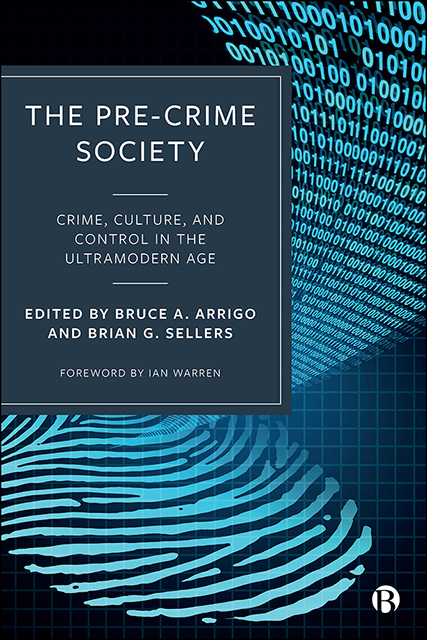Book contents
- Frontmatter
- Dedication
- Contents
- Notes on Contributors
- Foreword
- Introduction: The Ultramodern Age of Criminology, Control Societies and ‘Dividual’ Justice Policy
- Part I Theories, Theorists and Theoretical Perspectives
- Part II Institutions, Organizations and the Surveillance Industrial Complex
- Part III Dataveillance, Governance and Policing Control Societies
- Part IV Systems of Surveillance, Discipline and the New Penology
- Part V Globalizing Surveillance, Human Rights and (In)Security
- Afterword: ‘Pre-Crime’ Technologies and the Myth of Race Neutrality
- Index
5 - Visions of the Pre-Criminal Student: Reimagining School Digital Surveillance
Published online by Cambridge University Press: 14 April 2023
- Frontmatter
- Dedication
- Contents
- Notes on Contributors
- Foreword
- Introduction: The Ultramodern Age of Criminology, Control Societies and ‘Dividual’ Justice Policy
- Part I Theories, Theorists and Theoretical Perspectives
- Part II Institutions, Organizations and the Surveillance Industrial Complex
- Part III Dataveillance, Governance and Policing Control Societies
- Part IV Systems of Surveillance, Discipline and the New Penology
- Part V Globalizing Surveillance, Human Rights and (In)Security
- Afterword: ‘Pre-Crime’ Technologies and the Myth of Race Neutrality
- Index
Summary
Introduction
The concept of pre-crime, which has its origins in a Philip K. Dick short story, extends the temporal limits of criminal law and its associated practices, being ‘directed at monitoring, detaining, disrupting and, in some cases, charging and prosecuting groups and individuals considered to present a future threat’ (McCulloch & Pickering, 2010, p. 32). This highlights that pre-crime is concerned not only with surveillance but also with intercessions that involve prosecutions for crimes that have not occurred.
Problems exist with the contemporary notion of pre-crime. There is an inherent contradiction in suggesting that something is a crime, while a criminal activity has not occurred. Indeed, ‘future crime is paradoxical. The very act of possessing this data renders it spurious’ (Dick, 2013, p. 257). While legal systems often allow for prosecution of serious crimes where conspiracy or an attempt can be proven, pre-crime predictions seek to move far beyond such court-based procedures.
Importantly, there also exist clear definitional differences as to how the concept is applied. From a techno-realist perspective pre-crime is an evolution of a calculative rationality that has much in common with risk-based approaches to policing. Here ‘realist’ indicates a view that privileges the existence of a scientific, objective reality, while being dismissive of notions of subjectivity, social constructionism and interpretation. This approach uses the latest scientific and digital technologies to find associations that act as indicators of certain criminal intent. It finds embodiment in police departments’ use of predictive analytics for criminal justice purposes and national security agencies counter-terrorist activities. This viewpoint is strongly evident in the media, public policy and commercial narratives, where pre-crime is seen as a technological solution to an unknowable but calamitous threat.
From a cultural perspective, pre-crimes are accented to uncertainty rather than risk and involve moving from calculations of probability towards imagined possibilities. Thus ‘[p] re-crime provides a cast, script, stage and venue for performing harms and crimes that have not happened and material for “proving” catastrophic prophecy ranging from the intractable delinquency of marginalized young people to terrorism’ (McCulloch & Wilson, 2016, p. 43).
- Type
- Chapter
- Information
- The Pre-Crime SocietyCrime, Culture and Control in the Ultramodern Age, pp. 105 - 126Publisher: Bristol University PressPrint publication year: 2021



